Geotechnical
Field Tests
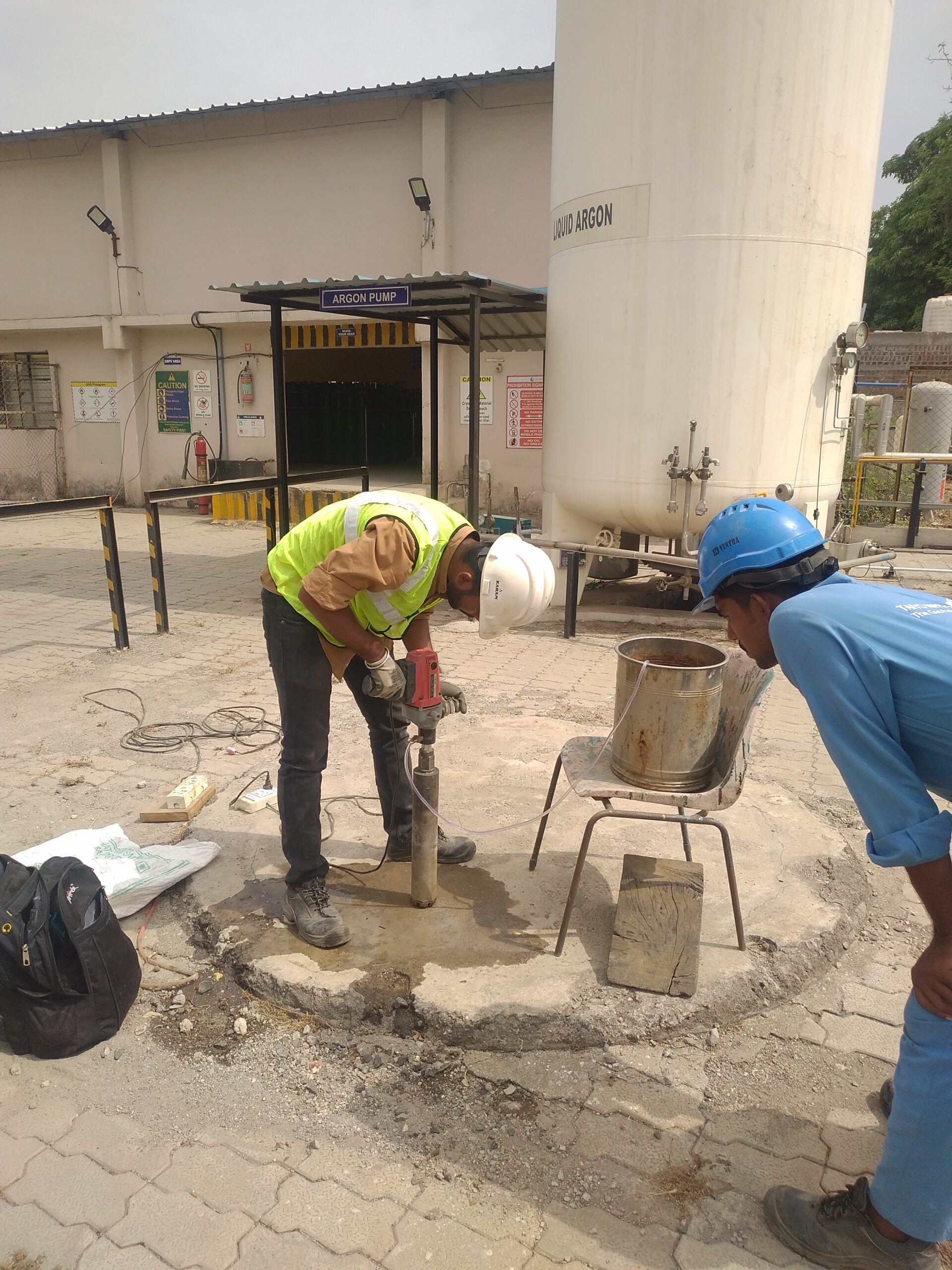
Geotechnical field tests
Geotechnical field tests provide essential information on the properties and behavior of soil and rock in their natural state. These tests are a direct measure of soil strength, stiffness, permeability, and compressibility, which is essential for designing safe and reliable foundations, earthworks, tunnels, and other infrastructure.
Field tests – Purpose and significance
- Measure the in-situ physical and mechanical properties of the soil and rock.
- Obtain information about the in-situ properties of the soil and rock at a site to design and ensure the safety and stability of the project.
- Determine the properties of the subsurface materials and their behavior under different loading and environmental conditions.
Our expertise and experienced team of geotechnical engineers, practitioners, site engineers and laboratory technicians ensure to perform the tests accurately and safely. Our invaluable experience to interpret the test results aids to make recommendations for foundation design, soil improvement, and other aspects of the construction project.
Plate load test
Plate load testing provides essential information about the allowable bearing capacity and settlement of soil, aiding in foundation design and construction
Plate load test – Importance
- To determine the bearing capacity and settlement characteristics of soil.
- To determine the safe bearing capacity of soil for the design of foundations, pavements, and other structures.
- To determine the allowable bearing pressure of the soil and the expected settlement under load.
- Mainly used for projects where the soil conditions are uncertain or where there is a risk of soil settlement.
VGeotech Experts has extensive experience conducting plate load tests using reaction truss, dead load, and vehicular loading methods. With our expertise and sophisticated equipment, we can accurately and safely design the test setup, select the appropriate plate size and load, and interpret the test results to ensure the safety and stability of your project.
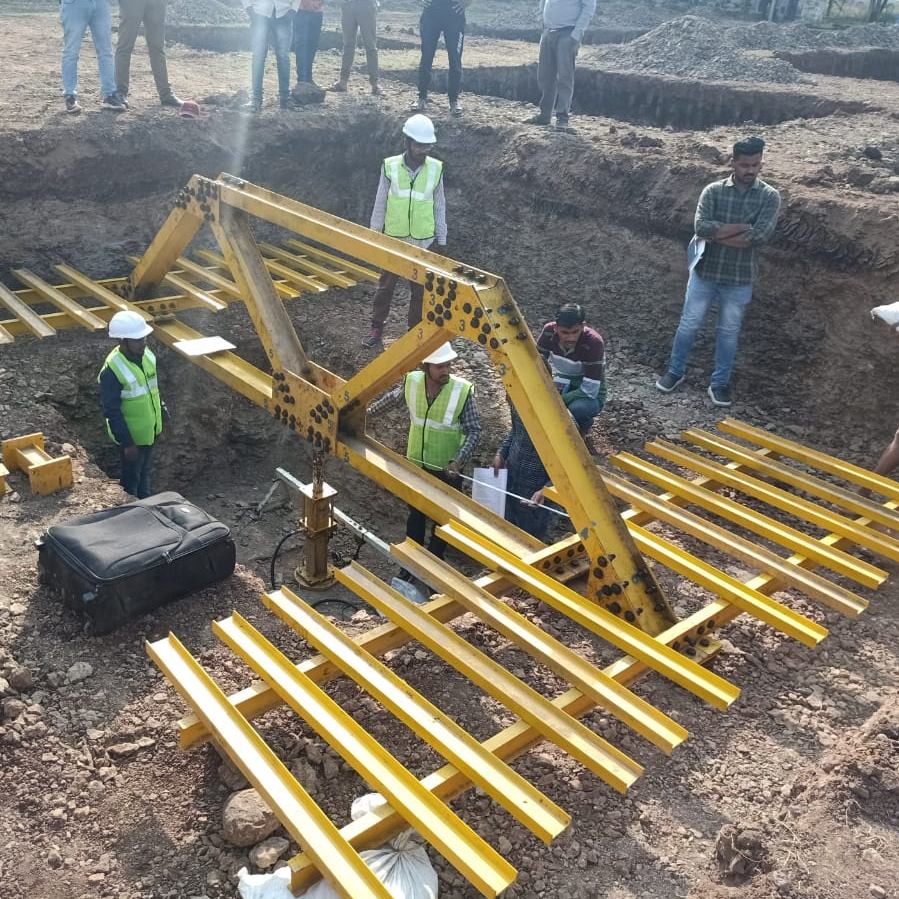
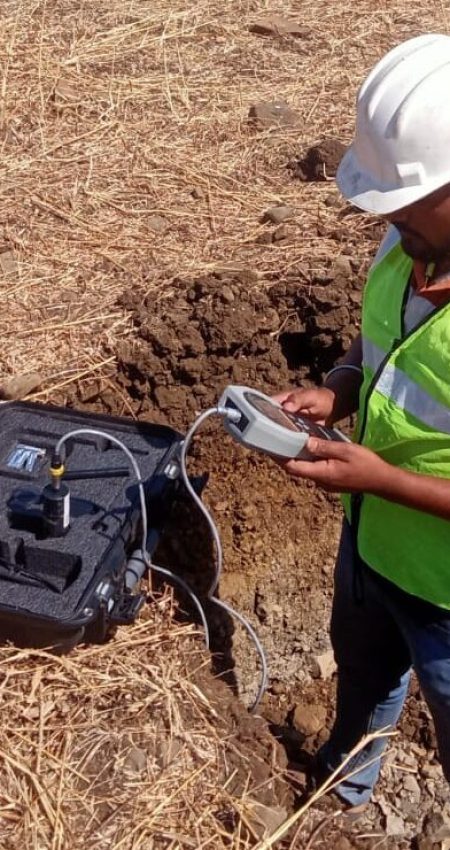
Thermal resistivity test
Thermal resistivity test is used to evaluate the thermal properties of soil, including conductivity and resistivity. It is essential for designing heat-transfer infrastructure like pipelines, geothermal, and energy storage systems.
Thermal resistivity testing – Applications
- To determine the thermal conductivity and resistivity of soil, important for designing infrastructure that involves heat transfer
- To evaluate the thermal properties for designing pipelines, tunnels, and geothermal energy systems.
- For design of underground transmission lines, oil and gas pipelines, radioactive waste disposal, and solar thermal storage facilities.
VGeotech Experts provide non-destructive testing for determining thermal resistivity and conductivity in soil samples, useful for installing electrical cables and underground lines within soil and rock strata.
Block Vibration Test
Block vibration test is used to measure the dynamic properties of soils, such as shear modulus, damping ratio, and wave velocity. It provides critical information on the soil’s stiffness and damping properties, which are essential in the design of infrastructure projects that are susceptible to dynamic loads, such as buildings, bridges, and pipelines.
The block vibration test is of two types: Horizontal Vibration test and Vertical vibration test
Block vibration test – Significance
- To determine the density, poisson ratio, stiffness, damping ratio, dynamic properties of soil, rock or any other underlying stratum
- To assess the quality of underlying soil/rock strata for infrastructure design
- To assess the performance of foundation under the application of dynamic loads
VGeotech Experts specialize in testing the dynamic properties of soil using Block vibration tests. We design the test setup, select the block size and vibration equipment, and interpret the results.
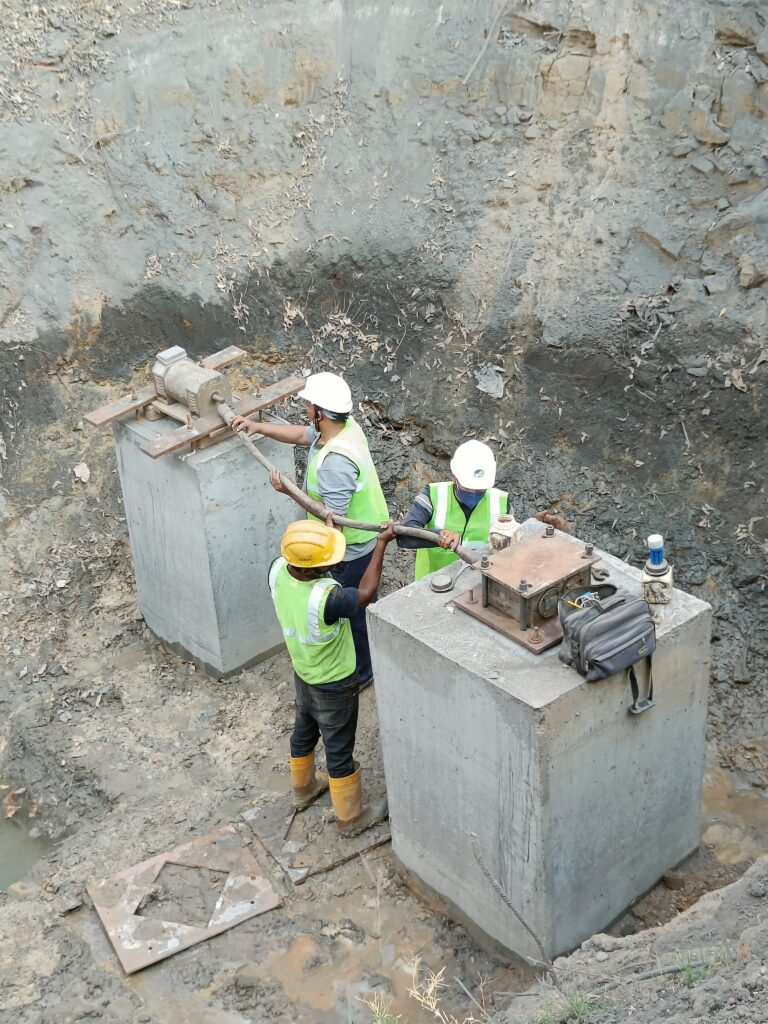
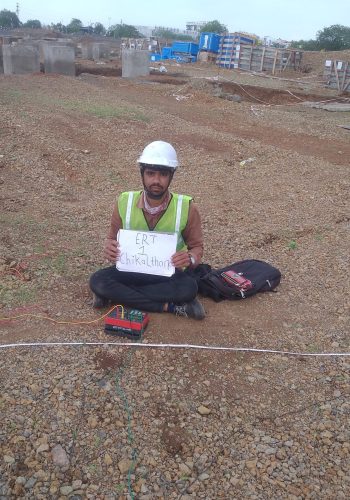
Earth Resistivity Test
Earth resistivity test is a type of geophysical survey used to measure the electrical resistance of the soil. It is useful in a wide range of applications, such as identifying the presence of underground utilities, mapping geological structures, and detecting groundwater.
Earth resistivity test – Applications
Measure the electrical resistance of soil and rock
Provide information on subsurface properties
To detect the presence of water, contaminants, or changes in soil or rock structure
Design and installation of the new grounding system
Designing stable foundations for structures such as buildings, bridges, and pipelines
VGeotech Experts offer non-destructive testing on in-situ and laboratory soil samples to determine electrical resistivity, which can be used to install electrical commodities, determine earthing depth, and more.
Field CBR
Field CBR (California Bearing Ratio) test is used to determine the strength and load-bearing capacity of subgrade soils. The CBR value can be used to evaluate the strength of subgrade soils and to design appropriate pavement thickness.
Field CBR (California Bearing Ratio) is a field test used to evaluate the strength and bearing capacity of subgrade soil.
Applications
- To assess the load-bearing capacity of the soil
- To determine the suitability of the soil for construction projects such as roadways, pavements, and other types of infrastructure.
- Used as indicator of the strength and stiffness of the soil
At VGeotech Experts, we design the test setup, select the appropriate plunger and loading equipment, and interpret the test results to determine the load-bearing capacity of the soil.
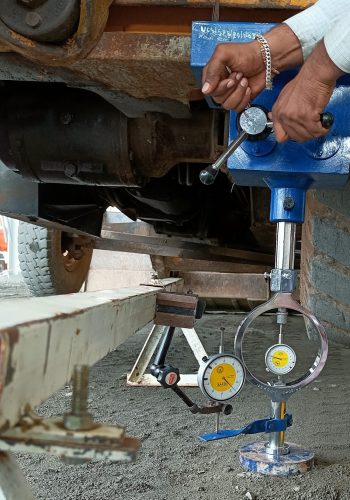

Pile Load Test
Pile load test provides essential information on the pile’s load-bearing capacity and its behavior under different load conditions.
Pile load test.
There are three main types of tests:
- Vertical load test – To determine the load-carrying capacity of the pile, deformation and ultimate failure characteristics
- Pull-out – To determine the frictional resistance between the pile and the surrounding soil
- Lateral load tests – To determine the lateral load resistance of the pile in conjunction with the surrounding soil
The dynamic pile load test is a type of load test conducted on deep foundation piles to assess their load-bearing capacity and structural integrity. It involves subjecting the pile to dynamic forces or impacts and measuring the corresponding pile response. Dynamic pile load tests offer several advantages. They are relatively quick to perform compared to static load tests and provide valuable insights into the pile’s dynamic behavior.
Pile load Test (Vertical, Lateral and Pull out)
Pile load testing evaluates the load-bearing capacity and behavior of deep foundations like piles and shafts. There are three main types of tests: vertical, pull-out, and lateral load tests. The results help optimize the pile design and reduce the risk of failure or excessive deformation. Pile testing is critical for buildings, bridges, and other projects with deep foundation support.
At VGeotech Experts, we have extensive experience conducting pile load tests for various projects, including solar power and bridges. We design the test setup, select the right loading equipment, and interpret the results accurately and safely. Trust us to assess the load-carrying capacity and deformation characteristics of your foundation piles.
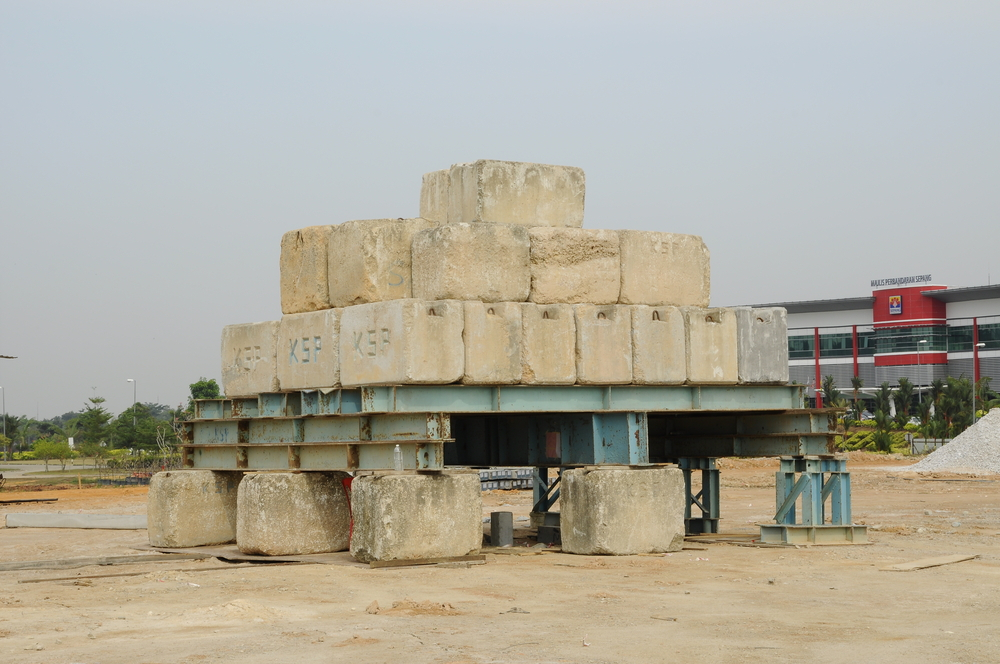
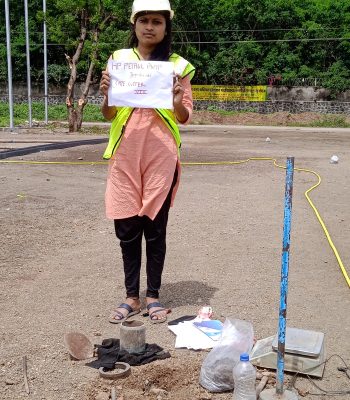
Field Density Test
Compaction of the soil at the field should be such that the desired unit weight of the soil at optimum moisture content could be achieved.
- Core cutter – clayey soils
- Sand replacement method – coarse grained soils
At VGeotech Experts, we have extensive experience conducting in situ density tests. Further interpretation of these values will be done to determine the degree of compaction.

